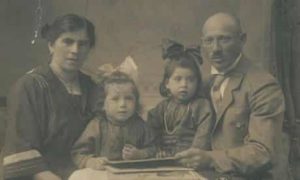
Alexander Wilde, now 90 years old. Photo: Glenn Russell, The Burlington (Vt.) Free Press)
His father had been taken to Dachau but wrote to tell his mother ‘to get the child out.’ First he was kicked out of school. Then Alexander Wilde’s family was kicked out of their home, he watched soldiers take his father away, his mother put him on a train to safety and he was unsure whether he would ever see her again. Article and video from USA Today and the Burlington VT Free Press.
Seventy-five years ago, 7-year-old Susanne Goldsmith watched her father wave goodbye, clutching a handkerchief in a crowd of people at a railroad station in Vienna, Austria. Burbank residents Goldsmith, 82, and David Meyerhof, whose mother was on the Kindertransport from Berlin, shared their stories at the Burbank Town Center Monday in commemoration of World Kindertransport Day and the 75th anniversary of the mission.
LONDON — “It was the festival of Hanukkah. The transports left in the evening… the authorities didn’t want the population to know what was going on. So, after we lit the candles my father blessed us and then we made our way to the station,” says Ruth Jacobs, who, together with her brother Harry Heber traveled by Kindertransport from Vienna to Britain in December 1938.
Radio interview on the site specific play “suitcases” being performed at a train station Liverpool in November, 2013. In the months between the Kristallnacht Pogrom of 9-10 November 1938, and the start of the Second World War nearly 10,000 children were sent, without their parents, out of Nazi Germany, Austria, Poland, and Czechoslovakia to safety in Great Britain.

(Tim Berger / Staff Photographer / December 2, 2013)
A group photo of Kinder, with members of the Burbank City Council and the Temple Beth Emet President Ira L. Goldstein and organizer and KT2 David Meyerhof at recognition of the 75th anniversary of the first Kindertransport at the Burbank Town Center on Monday, December 2, 2013. Kindertransport moved as many as 10,000 Jewish refugee children to safety from the Nazis by train and ship, mostly to England, from Vienna, Berlin, Prague and other major cities.

The Mayor of Boca Raton, Florida, declares December 2, 2013, World Kindertransport Day.
The concourse and platform of the Bristol railway station was the setting for Suitcase – a play about the first arrival of the Kindertransport in Britain – yesterday. In 1938 and 1939 thousands of mainly Jewish children were transported to the safety of foster families in Britain, arriving via ports such as Harwich before moving on to their new homes.

Lizzie (center), Ilse (bottom right), Hans (bottom left) Fritz (bottom center) and their parents.
When her parents escorted 16-year-old Alice, my aunt, to the Vienna train station, her father was crying. Her mother on the other hand, remained strong and optimistic. “She said, ‘We’re going to see each other again,’” Alice, nicknamed Lizzie, remembered. ”And I was like, I’m going to England, and I’ll be able to improve my English.” Seventy-five years ago today, on December 2, 1938, the first “Kindertransport” arrived from Germany in England.
Seventy-five years ago this week, the first group of children arrived without their parents at the Essex port of Harwich, and took a train to London’s Liverpool Street station. After the war, many of the children settled in Britain, their families having been murdered by the Nazis.These are the stories of five of those children.
Monday is world Kindertransport Day: the 75th anniversary of one of the great humanitarian missions of modern times. Imagine a world where 10,000 children were rescued from the holocaust by the kindness of strangers.
Seventy-five years ago this week, the first group of kids arrived without their parents at the English port of Harwich, and took a train to London’s Liverpool Street Station. Some 10,000 children, most but not all Jewish, would escape the Nazis in the months to come — until the outbreak of war in September 1939, when the borders were closed.
LONDON — The operation was called Kindertransport – Children’s Transport – and it was a passage from hell to freedom. Kristallnacht had just rocked Nazi Germany. The pogroms killed dozens of Jews, burned hundreds of synagogues and imprisoned tens of thousands in concentration camps. Many historians see them as the start of Hitler’s Final Solution.
Monday is World Kindertransport Day, with events to mark the anniversary in many countries. Seventy-five years ago this week, the first group of kids arrived without their parents at the English port of Harwich, and took a train to London’s Liverpool Street Station. Some 10,000 children, most but not all Jewish, would escape the Nazis in the months to come — until the outbreak of war in September 1939, when the borders were closed.
Marking the 75th anniversary of the Parliamentary debate that led to their rescue, the event began with a ceremony to rededicate the commemorative plaque unveiled in 1999 in gratitude for Parliament’s decision in November 1938 to start up the Kindertransport. Paying tribute to the Kinder, Speaker John Bercow also noted the huge strides made in the protection of human rights since the Holocaust.

Judy Benton as a child (second from right) with her family. Her parents later died in Auschwitz
When Hitler came to power, everything changed. By 1938 the Hitler Youth were very visible in my school. Suddenly no one spoke to me – if they did, they got into trouble. I was moved to the back of the class and my desk was painted yellow and said “here sits a dirty Jewish girl”. My work was no longer corrected, and despite being top of my class, I was not allowed to win the first place award – a copy of Mein Kampf.

Adam Schiff, representative of the 28th District of California recognizes the Seventy Fifth anniversary of the Kindertransports. Thanks to KT2 David Meyerhof, resident of Burbank, California. David will be speaking with Kind Suzanne Goldsmith on December 2nd, see the events page listing.

World Kindertransport Day Proclamation
KT2 David Meyerhof, resident of Burbank, California has made this happen! He will be speaking with Kind Suzanne Goldsmith on December 2nd, see the events page listing.

Susanne Goldsmith. Goldsmith, 82, was whisked out of Nazi-occupied Vienna with her brother Peter on Dec. 10, 1938 on a Kindertransport. (Photo by John McCoy)
Young Susanne and Peter Weiss had been whisked to England two years earlier when a strange couple appeared on their doorstep. The two Jewish children hadn’t seen their parents, Hans and Margaret, since fleeing Vienna aboard a Kindertransport. “They looked like such refugees,” recalled Susanne Goldsmith, now 82, of Burbank, of that day more than 70 years ago. “They were poorly dressed. They were haggard. Neither of us wanted to join them. “But we did — my parents didn’t give up.”
The revival of Diane Samuels’ Kindertransport has been prompted by the 75th anniversary of the first arrivals of the kinder, something that has led to another play on the subject, Suitcase, also touring this autumn.
Leo Metzstein, was one of the last of 10,000 Jewish children to flee Germany under the Kindertransport scheme before the war broke out in 1939. Born in Berlin, he was the youngest of five Metzstein children to escape the country in August 1939, with his sister Jenny. He lived in Hamilton, South Lanarkshire. He was the brother of the acclaimed architect Isi Metzstein, who died in January 2012.